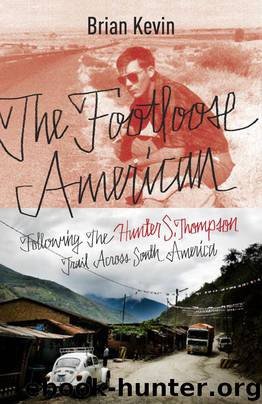The Footloose American: Following the Hunter S. Thompson Trail Across South America by Brian Kevin

Author:Brian Kevin [Kevin, Brian]
Language: eng
Format: epub
ISBN: 9780770436384
Publisher: Crown Publishing Group
Published: 2014-05-20T00:00:00+00:00
A few weeks before the Keiko/Humala election, a Peruvian newspaper published the results of a poll across nineteen Latin American countries, asking respondents whether they’d be willing to trade democracy for a military government if their country were somehow in dire straits. If you stacked up those results next to a decade’s worth of economic stats, you would notice a trend. In countries where economic growth has been steady—places like Panama, Uruguay, and Costa Rica—authoritarianism was exceedingly unpopular. Meanwhile, in countries struggling with poverty and stagnation, clear majorities said they would accept some form of military rule.
Peru was the conspicuous outlier in this comparison. Even after a decade of whirligig growth rates on par with India and China, 52 percent of the country answered that they would indeed support a military government. It was democracy’s fourth-poorest showing, behind near-destitute Honduras, Paraguay, and Guatemala. To understand this apparent contradiction is to understand how the country wound up choosing between “cancer and AIDS.”
Sure, the success of mining and other resource-extraction industries sent Peru’s stock market soaring in the 2000s, but only a small segment of the population felt the effects of the boom. The great majority of these beneficiaries were in Lima, home to the country’s investor and entrepreneurial classes. As many as two-thirds of all employable Peruvians, however, work in the “informal economy”—think street vendors, subsistence farmers, and unlicensed taxi drivers—which is a very long way down for the wealth to trickle, especially outside of the capital. Meanwhile, in the country’s far-flung Amazonian reaches, locals have taken to protesting what they see as exploitation of their natural resources while all the money flows steadily toward Lima. Dozens have been killed in periodic violent protests in the Peruvian Amazon since 2009, when a series of strikes and occupations brought much of the country to a standstill.
Of course, this dramatically lopsided balance of wealth and power stretches back well before the current mining boom, even well before APRA. Peru was ground zero for the Spanish conquest of South America, which kicked off in 1535 when Pizarro founded the city of Lima. Class subjugation, for that matter, was already a hallmark of the Inca Empire more than a century before the conquistadors even set sail. Highly stratified societies have been the norm in Peru for longer than any other place in the New World, and in Thompson’s mind, a lot of the country’s modern troubles could be blamed on a deep-seated cultural acceptance of the oppression of the many by the few.
“From the beginning of their history,” he wrote, “the Peruvian people have been conditioned to understand that there are only two kinds of human beings—the Ins and the Outs, with a vast gulf in between.”
For centuries, that gulf has been the dominant force behind Peru’s social and political development, and when the avowed leftist Ollanta Humala emerged from the last election three points ahead, the results were widely interpreted as a long-overdue victory of the Outs over the Ins.
Download
This site does not store any files on its server. We only index and link to content provided by other sites. Please contact the content providers to delete copyright contents if any and email us, we'll remove relevant links or contents immediately.
Futebol by Alex Bellos(1782)
Colombia Travel Guide by Lonely Planet(1606)
Touching the Void (1987) by Joe Simpson(1411)
Lonely Planet Guatemala by Lonely Planet(1387)
The Everything Gluten-Free Slow Cooker Cookbook by Carrie Forbes(1331)
The Unconquered by Wallace Scott(1286)
Betty Boo by Claudia Piñeiro(1110)
Lost in the Jungle by Yossi Ghinsberg(1094)
The Old Patagonian Express: By Train Through the Americas by Paul Theroux(1069)
First Comes Love, then Comes Malaria by Eve Brown-Waite(1039)
Practice Makes Perfect by Gilda Nissenberg(1023)
Ancient Technology in Peru and Bolivia by David Hatcher Childress(1017)
The Rough Guide to Belize by Rough Guides(1009)
Insight Guides Central America by Insight Guides(1000)
Open Door by Iosi Havilio(972)
The Rough Guide to Panama by Rough Guides(958)
Marching Powder: A True Story of Friendship, Cocaine, and South America's Strangest Jail by Thomas McFadden & Rusty Young(957)
Insight Guides: Chile by Insight Guides(944)
Impossible Journey by Michael Asher(938)
